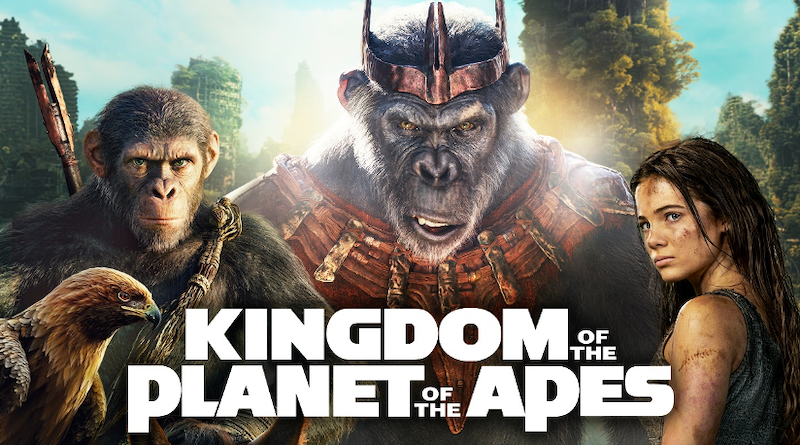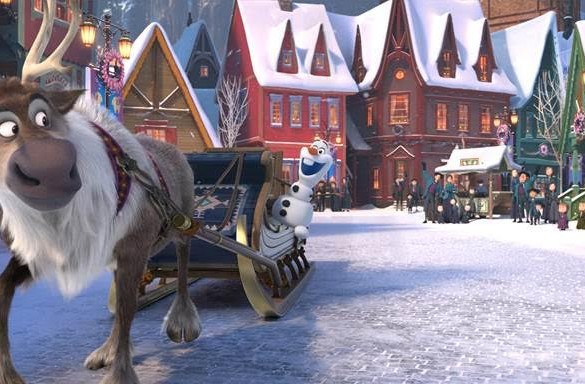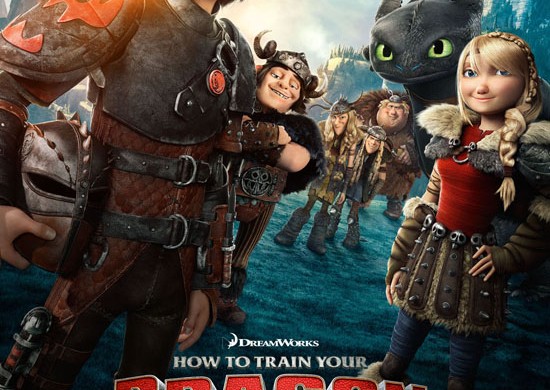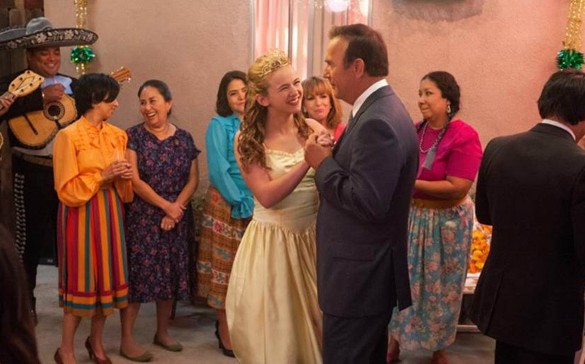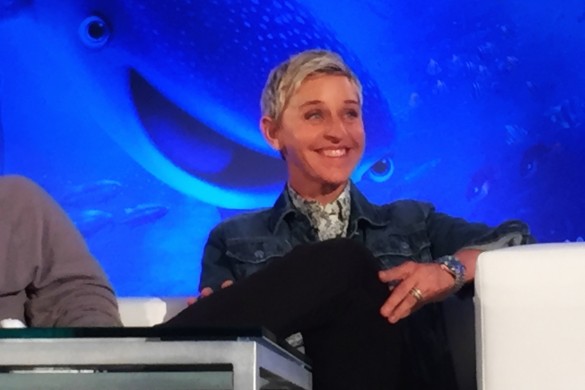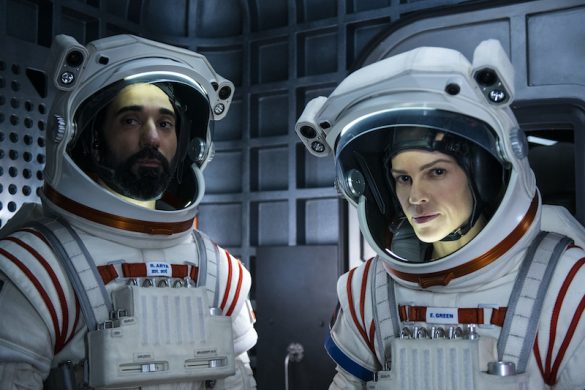The “Planet of the Apes” franchise has been reimagined and rebooted more than a few times since its release in 1968. However, it has never lost its iconic status as a story about the downfall of humanity and the rise of ape-kind. While reboots are not the most well-received projects, the key to “Kingdom of the Planet of the Apes” success is how it sustains the audiences’ interest with its great characters caught in the ongoing conflict between humans and apes. Longevity like that is hard to come by, especially in an age where studios want to release sequels faster than ever. And yet, here, Kingdom of the Planet of the Apes is sustaining the franchise’s longevity through engaging storytelling and an understanding that to keep that interest alive, one has to understand how the story has to evolve organically.
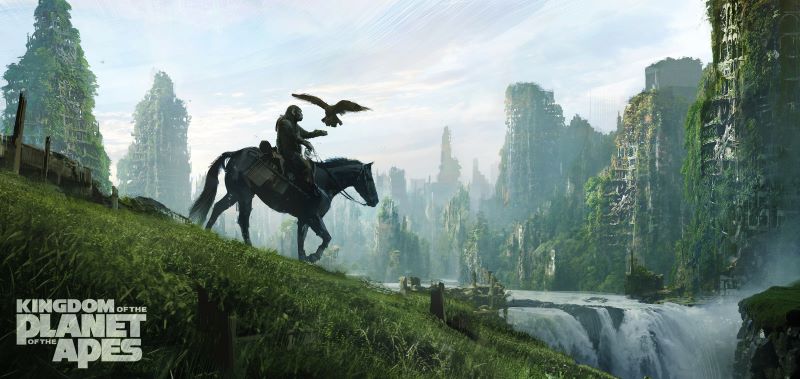
“Kingdom of the Planet of the Apes” is the fourth installment of the newest franchise launched with “Rise of the Planet of the Apes.” Though not considered a reboot, director Wes Ball’s film is more of an extension of a franchise rather than a continuation of a trilogy. So rather than pick up where “War for the Planet of the Apes” left off, its cold opening serves as a definitive ending to Caesar’s story, with all of Caesar’s clan gathering together for his funeral pyre. It’s a time for mourning as the apes, gorillas, orangutans, and others take the time to remember their leader as the glow of the fire illuminates a hand-drawn circle and diamond insignia.
Flash forward many generations later, and the film introduces us to an earth healing from the wounds of humanity’s infrastructural perversions. Fields of grass are growing once more. Decaying cityscapes are covered in vegetation. Apes are now thriving, while humanity has become more animalistic.
Noa (Owen Teague), a young chimpanzee from a falconry-practicing clan, prepares for a coming-of-age ceremony by collecting wild eagle eggs with his friends Anaya (Travis Jeffery) and Soona (Lydia Peckham). There are high expectations for Noa, who is the son of a master falconer. Though Anaya and Soona can collect their eggs, they must respect the nest and always leave one behind. Discouraged that he could go home empty-handed, Noa sees another nest resting on a cliff high above the building they just scaled. As such, he takes the more challenging climb to complete his quest.
Upon his return home, Noa, Anaya, and Soona encounter Echoes, humans who stay in the shadows out of the sight of apes or other alpha predators. As the master of eagles and Noa’s father, Koro believes that he still has a lot to teach Noa and that Noa still has a lot to learn before he can earn the respect of the eagles they have tamed. Nevertheless, he is impressed with what his son was able to accomplish.
When Mae (Freya Allan), a human scavenger, inadvertently cracks Noa’s egg, the young chimp goes out to search for a replacement egg. However, during his search, Noa discovers a group of ape raiders on horseback. They use electrical rods to incapacitate other apes. When they find Noa’s horse, they shock it, knowing it will lead them to its village. Noa hurries back but is unable to fend off the violent intruders who burn down his village and kill his father.
Alone, Noa embarks on a quest to save his family and fellow villagers captured by Proximus Caesar’s army. Simultaneously, Noa befriends Mae and Raka (Peter Macon), a wise and virtuous Bornean orangutan who understands Caesar’s original teachings.
Noa’s odyssey doubles as a journey of self-discovery as the young chimp has to accept the grim reality that his village elders did not teach him everything there is to know about the world. At first, he didn’t have much of an identity beyond his friendship and aspirations to live up to his father’s expectations. However, he becomes inspired by Caesar’s laws that apes shall not hurt other apes, that apes are stronger together, and knowledge is power after learning about it through Raka. Noa’s journey spotlights what happens when a Proximus Caesar (Kevin Durand) does anything to keep his power as king, including preaching a subverted version of Caesar’s teachings.
As much as “Kingdom of the Planet of the Apes” is a coming-of-age film, it is also a film about legacy and what the future holds for those who want to preserve it and for those who have yet to learn about it. Because the film has a generation gap between itself and “War of the Planet of the Apes,” Caesar’s fight for a peaceful co-existence between man and ape has become a legend. Since then, Apes have thrived while humanity has become more animalistic. As such, too many have forgotten who Caesar was. That is, until Proximus Caesar perverted the great leader’s teachings so that he could preserve his power as king. In a way, “Kingdom of the Planet of the Apes” has stirring echoes of the world we live in today, with those in power seeking to rewrite or revise history to retain their control over their kingdom.
“Kingdom of the Planet of the Apes” also marches towards the original by paying homage to the 1968 films by examining the ape and human dynamics. Though the film isn’t nearly as complicated when it comes to that examination, it plants the seeds by showing us how Proximus Caeser sees humans as mere beasts meant to be captured or used as tools to help him get closer to opening sealed blast doors that contain the human technology that could widen his kingdom.
“Kingdom of the Planet of the Apes” runs a lot longer than it should because much of that time is spent establishing where the film is placed within the timeline and providing the necessary exposition to help inform the audience of the story and distancing itself from its predecessors. While Raka’s knowledge of Caesar’s history helps bridge that gap, we see the film through Noa’s eyes as he guides us into a world that has been transformed by time.
“Kingdom of the Planet of the Apes” knows that for the franchise to move towards an exciting future, it must recognize how it got there. That means paying its respects to what Rupert Wyatt and then Matt Reeves have done for the original sequel while also paving to the 1968 original. The fourth installment of the new franchise does that in several ways by weaving in themes of the previous trilogy and introducing new ones. However, that does lead to some clunky pacing as it has to follow Noa on his quest to be reunited with his village while also reminding audiences of its connections to the previous Planet of the Apes trilogy through the use of Raka’s knowledge of Caesar and his teachings.
Of course, “Kingdom of the Planet of the Apes” wouldn’t have been here had it not been for the groundbreaking trilogy before it. Launched by Rupert Wyatt with “Rise of the Planet of the Apes,” and then followed through by Matt Reeves’s “Dawn of the Planet of the Apes” and “War for the Planet of the Apes,” the trilogy has been recognized for its rousing storytelling and a captivating performance by Andy Serkis who played as Caesar in all three films. The actor would bring more emotional depth and nuance to a digital ape. And his consultation would help the new cast embrace the idea that they weren’t wearing grey suits with ping-pong balls to pretend be apes, they were actually going to “be apes.”
Teague’s performance as the young Noa is terrific because, in a way, we are learning as much about the new world as he is. Though a bit naive, he grows to learn that the world is much bigger than he imagined and that his father only knew so much. As such, Noa is our guide in a coming-of-age story, and we will soon learn about the truth of Caesar’s legacy and how his teachings have been lost due to the ravages of time and the perversion of a mad king. Durand’s performance as Proximus Caesar is intimidating and a sight to behold. One can’t help but be enthralled by such a commanding performance that requires an equal balance of physicality and dynamics. Allan’s performance as Mae provides a more organic contentious relationship between herself and Noa, as she represents the generational traumas that have been passed down since the conflict between man and ape began. Peter Macon’s Raka plays a vital role as a historical bridge for that generational gap, informing the newer characters of who Caesar was and what he sought to achieve by creating a peaceful co-existence between man and ape. Although he is like history and those who teach it, he doesn’t fully understand it because he was never there to experience what life was like during the age of Caesar.
“Kingdom of the Planet of the Apes” strikes that balance between being a coming-of-age story and understanding legacy. It understands that it would not be here without the past and, as such, tries its best to revere it while also recognizing that it has to carve out its own path to distinguish itself from its predecessors. It may not be perfect in its execution. However, it’s still refreshing to see how this franchise can continue to grow without having it be a complete reset. If anything, Ball proves that this franchise has plenty of stories to tell.
“Kingdom of the Planet of the Apes” is available digitally now and will hit store shelves on August 27, 2024.
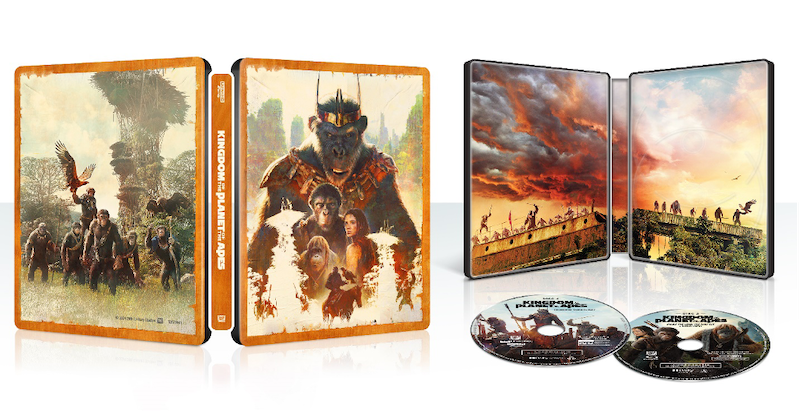
Here are a list of the bonus features that are included on the digital version of “Kingdom of the Planet of the Apes:”
• Inside the Forbidden Zone: Making Kingdom of the Planet of the Apes: Join director Wes Ball, cast and crew as they expand the Planet of the Apes legacy for a new generation. Travel to the outdoor production in Australia, train at Ape School, and discover the practical and motion capture techniques in building a breathtaking Kingdom.
• 14 Deleted/Extended Scenes with optional audio commentary by director Wes Ball.

